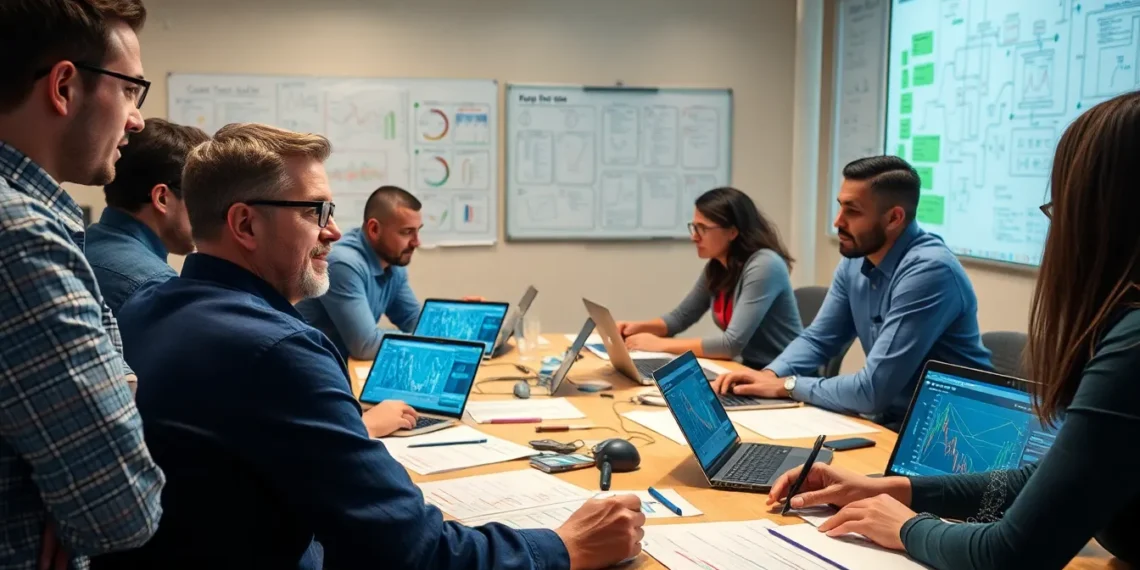In the midst of a pandemic, innovation took center stage, and the C3.ai COVID-19 Grand Challenge emerged like a superhero in a lab coat. This initiative called on the brightest minds to tackle the unprecedented challenges posed by the virus. With a hefty prize pool and the promise of global recognition, it transformed the fight against COVID-19 into a high-stakes competition where data scientists and researchers could flex their analytical muscles.
Imagine a world where algorithms and artificial intelligence come together to outsmart a virus. The challenge not only sparked creativity but also fostered collaboration among experts from various fields. As teams raced against the clock, they turned data into actionable insights, proving that when it comes to innovation, necessity really is the mother of invention. Get ready to dive into the fascinating world of the C3.ai COVID-19 Grand Challenge and discover how it’s shaping the future of healthcare.
C3.ai COVID-19 Grand Challenge
The C3.ai Covid-19 Grand Challenge launched to drive innovation in pandemic response. This initiative aimed to unite data scientists and researchers globally, focusing on developing AI-driven solutions. Participants tackled various challenges related to COVID-19, including predictive modeling and public health insights. The challenge stood out due to its substantial prize pool, totaling $3 million, attracting diverse talent across multiple disciplines.
Numerous teams submitted projects, showcasing different approaches to analyzing COVID-19 data. Contributors utilized machine learning algorithms to interpret complex datasets, offering actionable insights to healthcare providers. Solutions ranged from tracking virus spread to optimizing resource allocation, underlining the significance of data in decision-making processes during the crisis.
The collaboration fostered by the challenge emphasized the importance of teamwork among scientists, technologists, and healthcare professionals. Results showcased how quickly innovations could emerge, validating the role of AI in transforming healthcare responses. This initiative also highlighted the ongoing need for adaptable solutions in public health, further motivating future collaborations in the tech and medical sectors.
Significant partnerships emerged as a result, bringing together academic institutions and industry leaders. Organizations involved in the challenge recognized the potential of AI applications beyond the pandemic, paving the way for long-term advancements in healthcare technologies. As the world faces ongoing health challenges, the C3.ai Covid-19 Grand Challenge represents a critical step toward a more data-driven future in public health.
Goals and Objectives

The C3.ai COVID-19 Grand Challenge aims to stimulate innovative solutions to combat the pandemic. Participants focus on utilizing cutting-edge technology to enhance public health efforts effectively.
Collaborative Research Initiatives
Collaboration stands at the core of this initiative. Researchers from diverse backgrounds unite, sharing knowledge and expertise. By partnering with technologists and healthcare professionals, teams enhance their projects’ impact. These efforts lead to breakthroughs in understanding COVID-19, revealing how interdisciplinary cooperation drives progress. Furthermore, academic institutions and industry players actively participate in this collaborative environment. Their engagement expands the challenge’s reach, allowing for a broader exchange of ideas and results.
Data-Driven Solutions
Data serves as the foundation of the solutions produced through the challenge. Participants leverage vast datasets to uncover valuable insights about the virus. Machine learning algorithms play a critical role, analyzing real-time information to identify trends and patterns. These findings support healthcare providers, equipping them with tools to make informed decisions. Predictive modeling also emerges as a vital aspect, helping to forecast outbreaks and assess intervention effectiveness. Ultimately, data-driven approaches are crucial for formulating strategies that enhance community health and safety in a constantly evolving landscape.
Major Contributions and Findings
The C3.ai COVID-19 Grand Challenge yielded significant advancements through innovative contributions. Participants showcased a diverse array of solutions, incorporating advanced technologies to combat the pandemic effectively.
Innovative Technologies
Cutting-edge technologies played a central role in developing solutions. Machine learning algorithms emerged as key components in analyzing vast datasets. Predictive models effectively forecasted COVID-19 outbreaks and assessed intervention strategies. Data visualization tools improved the communication of critical insights, making complex information more accessible. Collaborations among teams led to breakthroughs in natural language processing, enabling better understanding of public sentiments and misinformation. These technological advancements have laid a foundation for ongoing research and application in public health.
Impact on Healthcare
Health providers benefited immensely from the challenge’s findings. AI-driven insights informed real-time decision-making, enhancing response strategies across various settings. Improved predictive modeling offered clarity on infection trends, allowing for more effective resource allocation. Participating teams developed dashboards that provided vital statistics, fostering transparency and accountability in healthcare systems. Collaborative efforts united researchers and practitioners, driving evidence-based practices that improved patient outcomes. These contributions affirmed the necessity of technology in modern healthcare, showcasing its potential to transform responses to public health crises.
Challenges Faced During the Initiative
The C3.ai COVID-19 Grand Challenge encountered several notable challenges during its execution. These hurdles shaped the development and efficacy of AI-driven solutions.
Data Privacy Concerns
Participants faced significant data privacy concerns when dealing with health-related datasets. User confidentiality and data security emerged as top priorities for researchers and organizations. Compliance with regulations such as HIPAA became essential to ensure participant trust. Moreover, balancing the necessity for data accessibility against the risks of data misuse created additional complexity. Efforts to establish protocols for data sharing and anonymization required ongoing discussion among teams. Addressing these issues effectively contributed to more secure and ethical research outcomes.
Technical Limitations
Technical limitations impacted many aspects of the challenge’s projects. Access to high-quality datasets posed a common difficulty, as incomplete or inconsistent data hindered model accuracy. Additionally, computational resources sometimes constrained teams from leveraging advanced algorithms and testing multiple scenarios. Interoperability between different systems also presented challenges, as integrating various tools and software proved complex. Participants navigated these constraints through collaboration, sharing insights and strategies to overcome technical barriers. Developing scalable solutions became essential for addressing the fast-paced nature of the pandemic and achieving impactful results on public health.
Future Implications and Directions
Future implications of the C3.ai COVID-19 Grand Challenge extend beyond immediate pandemic responses. Collaboration among diverse researchers fosters innovative solutions that can adapt to emerging health crises. This competition has highlighted the potential for AI to revolutionize public health strategies, offering the possibility of more efficient detection and management of infectious diseases.
Data privacy remains a critical consideration as health organizations integrate AI technologies. Developing robust protocols for protecting patient information becomes essential in maintaining trust and compliance with regulations such as HIPAA. Organizations must prioritize transparency in how data is used, fostering collaboration between healthcare providers and technology developers.
Continued engagement with interdisciplinary teams encourages the discovery of new applications for AI in healthcare. Breakthroughs from the challenge demonstrate how modeling techniques can predict future outbreaks, ensuring preparedness for future public health emergencies. Leveraging machine learning to refine predictive analytics enhances decision-making in real-time settings.
Investments in computational resources become vital for sustaining innovation in healthcare analytics. Facilitating access to high-quality datasets equips researchers with the tools necessary to uncover actionable insights. Addressing interoperability will further strengthen collaborations among various healthcare systems, enhancing overall effectiveness.
Insights gained from this challenge may influence policy development as health authorities learn from AI-driven outcomes. The successes and challenges encountered during the competition inform best practices for future initiatives, highlighting the importance of agile responses to crises. With evolving technology, the path ahead promises ongoing innovation in healthcare practices, ultimately benefiting public health frameworks and outcomes.
Conclusion
The C3.ai COVID-19 Grand Challenge has proven that collaboration and innovation can significantly enhance responses to global health crises. By uniting diverse experts in data science and healthcare, the initiative has fostered groundbreaking AI-driven solutions that address the complexities of the pandemic.
As the challenge demonstrates the potential of machine learning and predictive modeling, it sets a precedent for future interdisciplinary efforts in public health. The lessons learned about data privacy and resource sharing will be crucial as researchers continue to navigate the evolving landscape of infectious diseases.
Ultimately, the challenge not only advanced understanding of COVID-19 but also paved the way for a more resilient and adaptive healthcare system capable of responding to future emergencies effectively.









